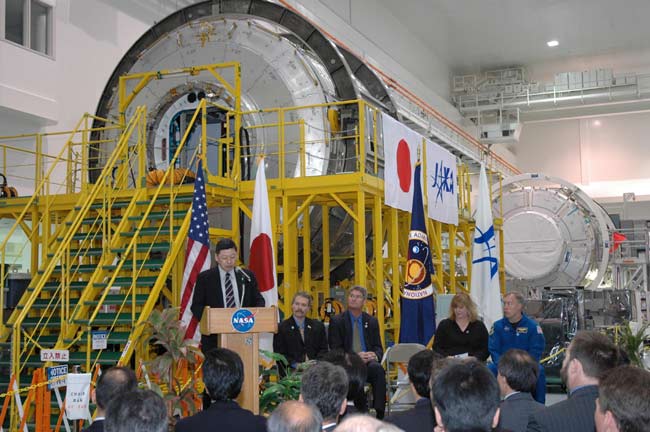NASA Spaceport Welcomes Japanese Space Station Component

A newpressurized module that will serve as a sort of orbital storage closet forJapan's Kibo laboratory at the International Space Station (ISS) received awarm welcome Tuesday at NASA's Florida spaceport.
ISSofficials held the welcome ceremony in the Space Station Processing Facility atNASA's Kennedy Space Center in Cape Canaveral, Florida to greet the new module,which will form part of the Japan Aerospace Exploration Agency's (JAXA) Kibolaboratory once in orbit.
Knownformally as the Experiment Logistics Module Pressurized Section, the new spacestation piece joins Kibo'sPressurized Module - a 37-foot (11.2-meter) long vessel - at KSC, though aporch-like external experiment platform is still in Japan, JAXA officials said.The logistics module will hold equipment and tools for the Kibo laboratory andfirst arrived at KSC in mid-March.
The JAXAlogistics module is due to launch towardsthe ISS no earlier than February 2008 aboard NASA's space shuttleEndeavour, to be followed by the longer pressurized laboratory in April. Themulti-component Kibo laboratory - whose name means "Hope" - is also known asthe station's Japan Experiment Module (JEM) and will have its own robotic armwhen complete.
"Now we areperforming launch site operations to check them out," Kichiro Imagawa, JAXA'sJEM development project manager, told SPACE.com Tuesday. "We think it'svery important to complete these tasks in the time remaining before launch."
Imagawasaid Kibo's external platform, which will allow astronauts and scientists toperform materials experiments by exposing samples to the space environment,will be delivered to KSC next year.
Japan'sKibo laboratory is one of several international laboratories awaiting launchtowards the ISS. The European Space Agency's Columbuslaboratory module is due to launch to the station no earlier than Dec. 6 ofthis year aboard NASA's shuttle Atlantis.
Get the Space.com Newsletter
Breaking space news, the latest updates on rocket launches, skywatching events and more!
The Russianaerospace firm RSC Energia is also constructing a multipurpose researchlaboratory for Russia's Federal Space Agency. The new module is slated tolaunch towards the ISS atop a Proton rocket at the end of 2008, Russia's InterfaxNews Agency reported last week.
Constructionof the ISS is slated to be complete by September 2010, when NASA plans toretire its aging space shuttle fleet.
- SPACE.com Video Interplayer: Space Station Ready for Orbital Expansion
- Complete ISS Mission Coverage
- All About the International Space Station
Join our Space Forums to keep talking space on the latest missions, night sky and more! And if you have a news tip, correction or comment, let us know at: community@space.com.

Tariq is the Editor-in-Chief of Space.com and joined the team in 2001, first as an intern and staff writer, and later as an editor. He covers human spaceflight, exploration and space science, as well as skywatching and entertainment. He became Space.com's Managing Editor in 2009 and Editor-in-Chief in 2019. Before joining Space.com, Tariq was a staff reporter for The Los Angeles Times covering education and city beats in La Habra, Fullerton and Huntington Beach. In October 2022, Tariq received the Harry Kolcum Award for excellence in space reporting from the National Space Club Florida Committee. He is also an Eagle Scout (yes, he has the Space Exploration merit badge) and went to Space Camp four times as a kid and a fifth time as an adult. He has journalism degrees from the University of Southern California and New York University. You can find Tariq at Space.com and as the co-host to the This Week In Space podcast with space historian Rod Pyle on the TWiT network. To see his latest project, you can follow Tariq on Twitter @tariqjmalik.









